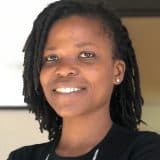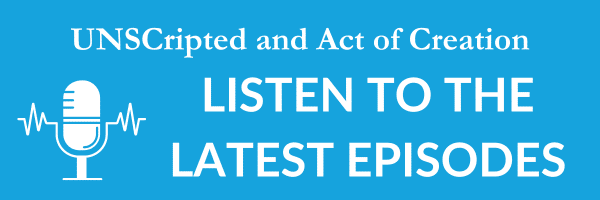
Naturally enough, Gabon is focusing on Africa as the country leads the United Nations Security Council this month. Gabon’s UN ambassador, Michel Xavier Biang, detailed his country’s plans for the rotating presidency, elaborating on a climate change agenda as well as counterterrorism, alignment of UN and African Union interests plus strengthening women’s resilience in conflicts.
One month before the climate change conference, COP27, is held in Egypt, African diplomats will demand more financing to help them better adapt to the warming globe, Biang told PassBlue in an exclusive interview last month.
Around 12 percent of the Congo basin in Central Africa extends into Gabon, a low-population density country on the Atlantic coast, home to about two million people. Ali Bongo Ondimba, Gabon’s president for the last 13 years, said in his speech to the UN General Assembly in September that his country absorbs 1.1 billion tons of carbon emissions, or four times the amount of greenhouse gas it emits.
“We need finance for adaptation, we need finance for those who are in the fire and are affected by climate change,” Biang said in his interview with PassBlue, on Sept. 28. The UN estimates that developing countries need a threshold of $78 billion annually to help communities and economies acclimatize to the droughts and floods drying up or drowning their crops. That amount is $22 billion less than the $100 billion that richer countries promised to developing ones at the climate conference in Copenhagen in 2009, for constructing green projects. Observers say the money that goes into adaptation from that envelope annually is less than half the amount promised. The British aid agency, Oxfam, says the financing that has been declared was inflated.
Many communities in Africa that are cracking under rising temperatures and other surges from warming trends have become hotbeds for terrorism and conflict. One victim is the West African nation of Niger, which ranks 189 on the Human Development Index, at the bottom of measures assessing a country’s socioeconomic progress. Niger and Ireland, another elected member of the Security Council, asked their fellow members in December 2021 to mandate the UN secretary-general to publish a report on the links between climate and security in December 2023. Russia vetoed the request, saying there was insufficient research to establish such a claim.
On Oct. 12, Biang said that the Council would hold an open debate, after three other countries have made such attempts to do so, to link climate change to security. “We think that many conflicts in Africa have as the main cause climate change,” Biang said. Gabon will hold another debate, on Oct. 6, on the illicit use of Africa’s natural resources to finance armed groups.
As a former Gabonese emissary to the Democratic Republic of the Congo, Burundi, Rwanda and Uganda — the Great Lakes region — Biang has first-hand experience of how natural-resource-driven conflicts have divided countries in the center of Africa. During his speech to the General Assembly, Congo’s president, Félix Tshisekedi, spent extensive time accusing the Rwandan government of funding the M23 rebels in the east of his country. This is a claim that has been substantiated twice by UN experts in the last 10 years. Rwanda denies the accusations.
“We are drawing the attention of the world and members of the Council on how to reinforce the international response against the financing of armed groups through the illicit trafficking of natural resources in Africa,” Biang said.
Gabon is Africa’s seventh-largest oil-producing economy, but its petroleum is drying up. The country has turned to preserving its tremendous amounts of forest while raising climate financing to sustain its efforts to move from fossil fuels.
In 2021, Norway gave Gabon $17 million through the Central Africa Rainforest Initiative, based on verifiable proof that the country reduced emissions from deforestation and forest degradation (REDD+). The country is the first in the continent to be paid for curbing greenhouse gas pollution under the terms of the United Nations Framework Convention on Climate Change (UNFCCC) initiative. The fund is part of a $150 million repository that the Norwegian government will pay Gabon in 10 years for the carbon it absorbs through the REDD+ strategy.
Yet the money does not come close to the needs of developing economies. Abdoulaye Ndiaye, a professor of economics at New York University who is originally from Senegal, told PassBlue that the overall financial structure of the world must change to help African countries gain access to funds that are not tied to their resources or that require restrictions.
Change could start with the Security Council considering the economic viability of developing countries as a security issue.
“I would be reminding countries in the Western world of their promises and obligations they made in the Paris summit to give special drawing rights to African countries in terms of climate financing,” he said.
Under Article 9 of the Paris Agreement, which emerged from the COP21 summit, in 2015, developed countries that signed on to the pact said they would “provide financial resources to assist developing country Parties with respect to both mitigation and adaptation in continuation of their existing obligations under the Convention.”
Biang said two of the Council debates in October — on the nexus between climate and security and on “resource trafficking” — will be followed by another conversation, on Oct. 20, on the role of women in peace and security.
“Women should, more than everyone, participate in the search for solutions,” he said. To reiterate that point, Gabon’s debate will be based on “reinforcing the resilience of women in regions plagued by armed groups.”
Data published by the Inter-Parliamentary Union in August said that women occupy 18.1 percent of elected seats in Gabon. Biang said his country is not preaching what it does not practice, as women hold top judicial and political offices. Yet the president, in office for 13 years, is a man.
On Putin’s war in Ukraine — a topic that will invariably come up in October — Biang told PassBlue that dialog remains the only solution to ending the fighting. He cited the Black Sea grain deal, led by the UN and Türkiye, as an example of a cease-fire being attainable in Ukraine. “That we had the grain agreement is a great hope that we still have and we always have and we should always seek negotiation,” he said.
During his Oct. 3 briefing with reporters at the UN, however, Biang was hammered with questions as to why he abstained in a Sept. 30 Security Council vote condemning Putin’s attempt to annex regions of Ukraine. (See video below.) Saying that his country agrees that Russia’s invasion breached the UN Charter and that the annexation declaration has no validity, Biang still flat-footed his answers, in the mind of at least six reporters who asked him the same question repeatedly. It’s crucial, he summed up without explicitly condemning Russia, “for the war to end.”
His position on the annexation question may reflect his country’s preference to remain neutral amid the perceived West vs. Russia battle, aware that Gabon is a developing country that needs support from all major powers, especially when the fighting may stop and the White House may fall back into Republican hands and ignore the economic needs of Gabon. (Brazil, China and India also abstained in the Council vote on Sept. 30. A similar draft resolution will be submitted to the General Assembly for a vote on Oct. 10. It will be a closely watched contest.)
<
Each month, PassBlue profiles UN ambassadors or other high-level diplomats as their countries assume the rotating presidency of the Security Council. To hear an original analysis with more details on Gabon’s presidency and insights from Abdoulaye Ndiaye, a professor of economics, download PassBlue’s podcast, UN-Scripted, on SoundCloud, Spotify, Stitcher or other podcast providers. (Excerpts from the podcast are below.) The episode is produced by Damilola Banjo and Kelechukwu Ogu, both based in Lagos, Nigeria.
Ambassador Biang spoke to PassBlue on Sept. 28. His comments have been edited and condensed for clarity.
Here is an excerpt — edited and condensed — from the interview with him:
PassBlue: What are Gabon’s signature events for the presidency of the Security Council in October? Gabon has been sitting at the table of the Security Council for more than nine months. In October, we want to draw attention and keep the spotlight on Africa, as we have an African mandate. On Oct. 6, we are drawing attention to how to reinforce the international response against the financing of armed groups through the illicit trafficking of natural resources. The second signature event will be on the 11th, on the important relationship between the UN and the African Union. On the 12th, we want to address, after three other countries have made attempts, the linkage between climate and security. Our last signature event will be about how women need to be fully involved in solving global and regional problems. Women are very resilient in regions plagued by armed groups. We think that women should participate more than everyone else in the search for solutions.
PassBlue: In Gabon, the number of women in your parliament is 18.1 percent, far lower than the 35 percent benchmark that the international community has agreed to achieve. Why is Gabon’s rate so low? We cannot preach abroad and to the world what we don’t do in our own country. Let me tell you that Gabon has four central institutions that rule the country: we have the president, we have the parliament, we have the supreme court and we have the prime minister. The president is a man. The president of the parliament is a female. The president of the supreme court is a female. The prime minister is a female. If you want me to continue, I’ll say the minister of defense is a female. The minister of security is a female. I challenge you to give me an example in Africa where we have such a deployment of women in the highest posts of responsibility. The more we have women in international governance, the better the world will be.
PassBlue: How has Gabon voted pertaining to Russia’s aggression in Ukraine in the General Assembly and what influences some of the positions you have taken? Our vote has been following our principles. First, we are against war. When it came to “who is for the war and who is against the war,” we voted against the war. Our vote was for humanitarian assistance without any impediment. When it came to human rights, we voted for no politicization of human rights. [The Assembly voted to suspend Russia from the Human Rights Council in April]
PassBlue: Do you think Russia is willing to come to the negotiation table? We have the experience, the grain agreement of a few weeks ago. [Black Sea grain deal, signed on July 22] Nobody could imagine that at the moment that guns are blowing, we could reach such an ambitious agreement. This agreement is an encouragement for the UN, for all the parties who are interested in seeking negotiation.
PassBlue: Russia’s war in Ukraine has brought the weakness of the Security Council to the fore, and calls for reform of the body are louder than ever. Do you think there will be an alignment of interests regarding the composition of the Council and the use of veto power in the near future? The African position is very clear. It is contained in the Ezulwini Consensus and the self-declaration. If the Council has to remain in the setting of today, Africa wants two places for permanent members and five places for nonpermanent members. This is the common position in Africa. I can tell you that Africa is the only region of the world who has not participated in the setting of the international order we have today, and it has no place, no seat around the table. And you know that 70 percent of the Security Council agenda is based on African matters. We want to sit where our matters are discussed, and we will do everything we can for that.
Gabon’s Ambassador to the UN: Michel Xavier Biang
Ambassador to the UN since: 2017
Languages: French, English
Education: Diplomacy degree from Gabon’s École Nationale d’Administration and a master’s in public law from Omar Bongo University, Gabon
His story, briefly: As an ambassador, Biang has worked in some troubled spots in Central Africa. Before becoming Gabon’s permanent representative to the UN, in 2017, he was the ambassador to the Democratic Republic of Congo, also covering Rwanda, Burundi and Uganda, from 2015. Before then, he held various roles in his country’s ministry of foreign affairs and was the deputy permanent secretary to the National Climate Council, in charge of international climate-change negotiations (2014 to 2015). He also served as a legal adviser to Gabon’s Civil Aviation Authority, from 2012 to 2014. His first posting to the UN was as the legal adviser to the president of the 59th General Assembly, from 2004 to 2005. In addition, he was elected chair of the General Assembly’s Sixth Committee (legal affairs) in 2018. Biang also doubles as the permanent representative of Gabon to the International Seabed Authority.
Country Profile
President of Gabon: Ali Bongo Ondimba
Minister of Foreign Affairs: Michael Moussa Adamo
Type of Government: Presidential
Year Gabon Joined the UN: 1960
Years in the Security Council: Jan. 1, 2022-Dec. 31, 2023
Population (2020): 2.226 million
Per capita CO2 emission figures for 2020: 2.84 metric tons per person (based on a population of 2,007,873 in 2016)
We welcome your comments on this article. What are your thoughts on Gabon's menu for the Security Council?
Damilola Banjo is a reporter for PassBlue. She has a master’s of science degree from the Columbia University Graduate School of Journalism and a B.A. in communications and language arts from the University of Ibadan, Nigeria. She has worked as a producer for NPR’s WAFE station in Charlotte, N.C.; for the BBC as an investigative journalist; and as a staff investigative reporter for Sahara Reporters Media.














Two things that may be worth pondering:
1. Interesting that Kenya already has a significant investment in energy production through renewable sources with the majority coming from geothermal power and hydroelectricity as well as substantial wind-power.
2. As the UN well knows, aid funds are not always the most efficient way. Bilateral support could be better.